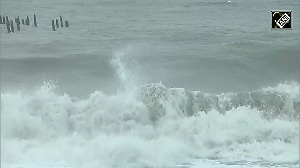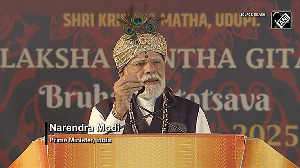The euphoria over the consensus approval of the safeguards agreement by the Board of Governors of the International Atomic Energy Agency must be tempered by the fact that nearly 30 countries made a variety of statements, which, in some cases, detracted from the universal support for it.
As one of the statements made it clear, the architect of the consensus was none other than Mohamed ElBaradei, the Director General of the IAEA.
One delegation said that it would not have joined the consensus, had it not been for the robust support the DG gave to the agreement. The DG's assertion that the agreement met the needs of India and the legal requirements of the IAEA swung the opinion of the Board in India's favour even though many countries had reservations about the agreement.
In his passionate support for the deal, the DG was not unaware of the undercurrents in the Board and he dealt with some of them in a masterly fashion. The most important of these was the accusation of Pakistan that the nuclear deal was discriminatory, a theme which is likely to surface again in the Nuclear Suppliers Group.
Without naming Pakistan, he made it clear that this was indeed a precedent which could apply in identical circumstances. It was obvious to all that Pakistan would have to clear the A Q Khan scandal before aspiring to such treatment.
In stressing the need for inclusiveness, he even mentioned the need for Pakistan and Israel also to come into the non-proliferation mainstream, a point he had been making long before the India deal came about. By stressing the development and non-proliferation dimensions of the deal, the DG carried conviction.No amount of bilateral efforts by India would have given the same results, as was seen by the attitude of countries like Austria, Ireland and Switzerland, which have excellent bilateral relations with India.
The statements of China and Iran were of special significance as they revealed their mind as the perceived targets of the US in arriving at the nuclear deal with India. China, in its statement, did not say, as is customary, that it was joining the consensus in favour of the agreement. It simply referred to the various objections raised by other countries and left the door open for further discussions in the NSG.
Iran was explicit in its accusation that the deal represented the 'double standards' of the US, which was willing to accommodate India's energy needs, while opposing similar aspirations on the part of Iran. These statements may well reverberate in the NSG chambers, where the soothing presence of the DG of IAEA will not be there.
The ominous explanations of some of the NSG countries in the Board should alert to the perils ahead. Our repeated demand that there should be a 'clean and unconditional' exemption from NSG guidelines cannot but prejudice the minds of the NSG members and even of the US.
The whole exercise of exemption is based on certain conditions, which did not exist before, like the 123 agreement and the IAEA safeguards agreement. Is it realistic to expect that the NSG would grant the exemption without reference to any of these documents? Would such references be considered conditional or not? The whole exercise of the deal is based on certain conditions that India put forward in the Joint Statement of 2005.
How can the NSG not take note of those conditions? If India takes the position that no conditions will be acceptable, a situation may arise when India will have to walk away from the deal at that stage. Hopefully, India has its own understanding as to what unconditional exemption means. A certain flexibility in this position is essential to carry the deal through.
Another peril ahead for India is an Additional Protocol that India has to negotiate with the IAEA. The talks have already begun and the IAEA secretariat realises that the standard Additional Protocol, which demands unconditional access to any facility, normally signed by non-nuclear weapon states, will not fly in the case of India.
But the whole concept of the Additional Protocol is meant to close the loopholes in the safeguards agreement and to give IAEA additional authority to deal with contingencies. The opponents of the deal in India will find the Additional Protocol a red rag to go for.
There could still be many a slip between the cup and the lip. Our own internal debate, which involves demands for total freedom and the assurances being given of securing satisfactory conclusions at any cost will only aggravate the situation in the eyes of the non-proliferationist countries and lobbies.
Some restrained satisfaction over the outcome at the IAEA and a realistic approach to the NSG decision will help us overcome the hurdles of the future. We are yet to arrive at our final destination and the path ahead is hazardous.
T P Sreenivasan, a former member of the Indian Foreign Service, was India's ambassador to the United Nations, Vienna, and governor for India, International Atomic Energy Agency, Vienna.





